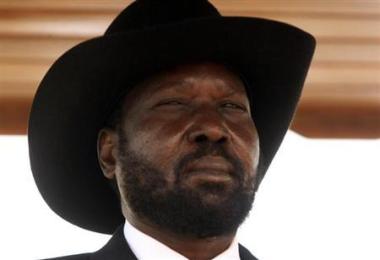Kiir forms committee for SPLM leadership meeting
March 5, 2014 (JUBA) – South Sudan president Salva Mayardit has formed a preparatory committee tasked with making the arrangements for an upcoming meeting expected to bring together rival groups within the leadership of the ruling Sudan People’s liberation Movement (SPLM).

It is not clear what issues the committee will discuss, but multiple sources and officials with direct knowledge of the arrangement have told Sudan Tribune that the focus of the meeting would be on internal reconciliation among the party’s leaders.
Members of the committee loyal to the government were expected to travel to the Ethiopian capital, Addis Ababa on Wednesday, where a meeting is planned to take place.
The meeting is reportedly facilitated by the ruling parties of Ethiopia (EPRDF) and South Africa (ANC) due to their knowledge of the current crisis in the governing SPLM.
Daniel Awet, a member of the political bureau and close ally of the president, confirmed the formation of the committee and the convening of the high-level meeting.
The committee comprises of Daniel Awet Akot, Paul Mayom, Akol Paul, Jemma Nunu, Deng Alor, John Luk Jok, Kosti Manibe and Taban Deng Gai.
The planned meeting will be the first official function to bring together rival factions within the SPLM, who have so far struggled to reach an agreement on the agenda at the level of the political bureau since differences emerged.
Luka Biong Deng, a senior member of the SPLM, also confirmed the formation of the committee.
He called on the civil society organisations and other political parties to help set the agenda of the meeting.
“Although the negotiations are stalled, the current focus on the reconciliation within the SPLM is a right move and civil society organisations and other political parties should make sure that their voices are heard in setting the agenda for the SPLM political bureau,” he said.
SACRIFICIAL LAMB
While many have welcomed the emphasis on internal reconciliation as a significant step, several others have expressed scepticism over whether president Kiir would respect the outcome of the meeting.
“The convening of the political bureau meeting is what precipitated the violence. The president himself repeatedly refused to call it, even when influential groups, including respected personalities and religious leaders, emphasised the significance of reconciliation,” a dissident official within the SPLM told Sudan Tribune.
Critics have charged officials surrounding the president of preventing him from listening to the voice of others.
“Kiir does not listen. He has been [so] spoiled by the people around him that he [only] sees with his own eyes. The meeting he is now accepting is what he had been refusing. What purpose will it serve after the loss of thousands of lives of innocent people,” the official said.
However, Deng Awuol, a native of Jonglei state, said the convening of the meeting was necessary because it would enable the country to move forward and ensure the 2015 general elections went ahead without conflict.
“There is no reason to hate each other. I think president Kiir will reflect on the cause of the liberation in which he spent much of his time fighting in the bush. So, I welcome the convening of this meeting if it is true that the president had accepted holding it,” Awuol said on Wednesday.
Analysts and independent observers have welcomed the move, but gave different interpretations, with some calling it an attempt by the government to divide and weaken the strength of the opposition.
“This is the first time I am hearing about it. Anyway, I am not surprised because politics is the art of possibilities. But what I know is that this is an attempt by the government to divide and weaken the strength of the opposition,” said a local political commentator who did not want to be identified.
“You know that Taban Deng Gai, who is now on the committee, has been charged with treason by the government of president Salva Kiir. What does this mean? It means either Taban had been bought off by the government to abandon rebellion and join the government or he is sacrificing Riek Machar and his group,” he added.
However, another commentator said he expected such a development given the background of Gai and army dissident Major Peter Gadet Yak.
“Riek is a sacrificial lamb for the return of Taban to the fold of leadership. He is like General Peter Gadet Yak. If Riek is not careful, they can even kill him to return to the fold of leadership. We saw that in the way Gadet frequently switched sides between Khartoum and several militias and the SPLA (the South Sudan army) during [the] war. Taban went with Riek in [the] 1991 split and later returned [to the then rebel group] before Riek,” another political commentator said on condition of anonymity.
He added that he would not be surprised to see Gai rejoining the government fold “and leave Riek like he did before”.
(ST)
